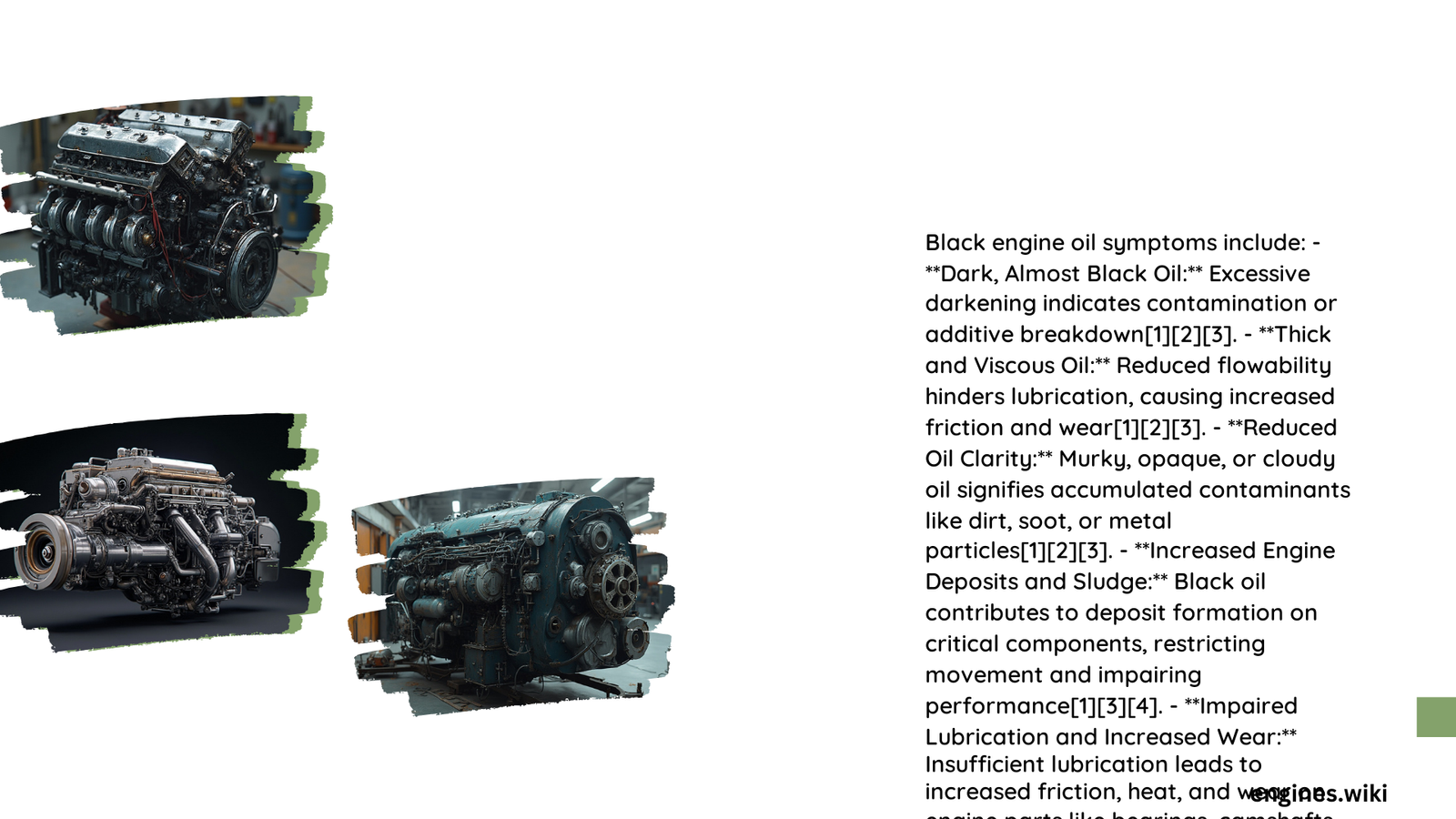Black engine oil symptoms are crucial indicators of potential engine problems. These symptoms include dark, murky oil appearance, decreased engine performance, unusual noises, and a burning smell. Understanding these signs can help prevent severe engine damage and costly repairs. This article explores the various symptoms of black engine oil, their causes, and implications for your vehicle’s health.
What Are the Visual Indicators of Black Engine Oil?
The most apparent symptom of black engine oil is its appearance. Here are the key visual indicators:
- Color: The oil becomes dark, almost black, instead of its usual amber or light brown color.
- Clarity: The oil appears murky, opaque, or cloudy, indicating the presence of contaminants.
- Consistency: It may look thick and viscous, resembling molasses rather than a fluid lubricant.
These visual changes signify that the oil has accumulated contaminants such as dirt, soot, or metal particles. This accumulation reduces the oil’s ability to lubricate engine components effectively.
How Does Black Engine Oil Affect Engine Performance?

Black engine oil can significantly impact your vehicle’s performance in several ways:
- Reduced Acceleration: You may notice sluggish acceleration or a harder working engine.
- Decreased Overall Performance: The vehicle may not run as smoothly or efficiently as before.
- Unusual Noises: Knocking, ticking, or rumbling sounds can occur due to inadequate lubrication.
- Increased Engine Deposits: Sludge can accumulate on critical engine components, restricting their movement.
These performance issues arise because contaminated oil cannot properly lubricate engine parts, leading to increased friction and wear.
What Are the Olfactory Characteristics of Black Engine Oil?
While the smell isn’t always a definitive indicator, black engine oil can produce certain olfactory characteristics:
- Burning Oil Smell: A strong, burning odor may be present, especially when the engine is running.
- Chemical Odor: The oil might emit a distinct chemical smell due to the breakdown of additives and contaminants.
These smells can indicate that oil is burning within the engine’s combustion chamber, possibly due to leaks or failed components.
How Does Black Engine Oil Lead to Sludge Formation?
Black engine oil can contribute to sludge formation in the following ways:
- Extended Oil Change Intervals: Prolonged use without changes allows contaminants to accumulate.
- Engine Overheating: High temperatures can accelerate oil breakdown and sludge formation.
- Additive Breakdown: As oil additives degrade, they can contribute to sludge buildup.
The resulting sludge is a thick, tar-like substance that can:
- Hinder proper oil circulation
- Reduce lubrication efficiency
- Increase wear on engine components
- Potentially block oil passages
What Are the Common Causes of Black Engine Oil Contamination?
Several factors can contribute to the contamination of engine oil:
| Cause | Description |
|---|---|
| External Contaminants | Dirt, dust, and debris entering through damaged air filters or improper maintenance |
| Combustion Byproducts | Accumulation of soot and carbon particles from the combustion process |
| Internal Engine Issues | Worn piston rings, damaged valve seals, or coolant leaks |
These contaminants can alter the oil’s viscosity and reduce its lubricating properties, leading to increased engine wear and potential damage.
How Does Black Engine Oil Impact Oil Viscosity?
Black engine oil can significantly affect oil viscosity:
- Thickening: Contaminants can cause the oil to become thicker, making it harder to circulate.
- Thinning: In some cases, breakdown of oil molecules can lead to decreased viscosity.
- Inconsistent Viscosity: The oil may not maintain proper viscosity across different temperatures.
These changes in viscosity can result in:
- Improper oil circulation
- Increased engine temperatures
- Potential engine damage due to inadequate lubrication
What Are the Long-Term Effects of Black Engine Oil on Engine Components?
Prolonged use of black engine oil can have severe consequences for engine components:
- Increased Wear: Contaminated oil leads to more friction between moving parts.
- Premature Component Failure: Bearings, camshafts, and pistons may fail earlier than expected.
- Reduced Engine Lifespan: Overall engine life can be significantly shortened.
- Decreased Fuel Efficiency: The engine may consume more fuel due to increased friction and inefficient operation.
How Can You Prevent Black Engine Oil Symptoms?
To avoid black engine oil symptoms, consider these preventive measures:
- Regular Oil Changes: Follow manufacturer-recommended oil change intervals.
- Use Quality Oil: Choose the right grade and type of oil for your vehicle.
- Replace Air Filters: Regularly change air filters to prevent contaminant entry.
- Address Leaks Promptly: Fix any oil or coolant leaks as soon as they’re detected.
- Avoid Short Trips: Frequent short trips can lead to oil contamination due to incomplete engine warm-up.
By following these steps, you can help maintain clean, effective engine oil and prevent the issues associated with black engine oil.
